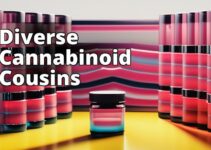Post-traumatic stress disorder (PTSD) is a debilitating mental health condition that results from exposure to traumatic events. Traditional treatments include therapy and medications, but recent research suggests that cannabidiol (CBD), a non-psychoactive compound found in cannabis, may offer an alternative solution to those suffering from PTSD. This article will delve into the potential benefits of using CBD for PTSD symptom reduction, as well as its administration methods and integration with routine psychiatric care.
The Science Behind Cannabidiol and PTSD
Cannabidiol has been studied for its potential therapeutic effects on various conditions, including anxiety, depression, chronic pain, and inflammation. In recent years, CBD has garnered attention for its possible applications to PTSD. The endocannabinoid system in our bodies plays a crucial role in modulating the processing of emotional memories, which is closely related to PTSD symptoms. CBD's interaction with this system could potentially prove beneficial in treating this mental health disorder.
Endocannabinoid System and Emotional Memory Processing
The endocannabinoid system is comprised of receptors located throughout the body, responsible for regulating numerous physiological processes. Among these is the modulation of emotional memory processing. Studies have shown that the activation of certain endocannabinoid receptors can help extinguish aversive memories, which are typically associated with PTSD symptoms.
In relation to this, CBD has shown promise in aiding the endocannabinoid system's process of eliminating negative memories by inhibiting the enzyme fatty acid amide hydrolase (FAAH). FAAH is known to break down anandamide, a natural endocannabinoid responsible for promoting feelings of happiness and wellbeing. By inhibiting FAAH, CBD increases anandamide levels, which could consequently help alleviate PTSD symptoms.
Reducing Anxiety and Fear Response
Besides its role in the endocannabinoid system, CBD has also demonstrated anxiolytic properties, meaning it can reduce anxiety. This is particularly relevant to PTSD, as heightened anxiety and fear response are common symptoms of this disorder. By reducing anxiety and regulating fear response, CBD might assist in managing these aspects of PTSD, making it a viable option for symptom reduction.
CBD Administration Methods for PTSD
Different administration methods can impact both the onset and duration of CBD's effects, making it essential to choose the most suitable one for your needs. The common ways of taking CBD include:
- Vaping or smoking: Inhalation offers rapid absorption into the bloodstream, providing quick relief from symptoms. However, the effects may be short-lived compared to other methods.
- Sublingual tinctures: Placing drops of CBD oil under the tongue ensures fast absorption while leaving a longer-lasting effect than inhalation.
- Oral ingestion: Capsules or edibles provide a slow-release form of CBD, offering extended relief but with delayed onset.
- Topicals: While primarily used for localized pain or inflammation, topical creams can still deliver relaxing effects that may benefit those with PTSD-induced anxiety.
Choosing the right method depends on personal preference, the severity of symptoms, and how quickly relief is needed. It's advised to consult a healthcare professional before starting any new treatment routine.
Integrating CBD with Routine Psychiatric Care
While promising, CBD should not be considered a standalone treatment for PTSD. Instead, it may serve as an adjunct therapy, complementing existing treatments such as psychotherapy and pharmacotherapy. Combining CBD with routine psychiatric care could enhance the overall effectiveness of PTSD treatment, addressing various symptoms that might not be fully managed by traditional methods alone.
Working with a Healthcare Professional
Before integrating CBD into your treatment plan, it's crucial to discuss it with your healthcare provider. They'll be able to give you guidance on appropriate dosages, potential drug interactions, and monitor your progress throughout the treatment process. The inclusion of CBD should always be done under professional supervision to ensure optimal results and safety.
Study Findings: CBD for PTSD in Adults
Though research is still in its early stages, some studies have shown promising results when it comes to using CBD for PTSD symptom reduction in adults:
- A 2019 study published in the Journal of Alternative and Complementary Medicine found that oral CBD administration led to significant improvements in sleep quality and reductions in nightmare frequency among PTSD patients.
- In a 2016 case report, a ten-year-old girl suffering from PTSD-related insomnia and anxiety experienced substantial relief after starting a regimen of sublingual CBD oil, ultimately resulting in improved sleep quality and reduced anxiety levels.
- A small pilot study conducted in 2018 revealed that CBD, alongside psychotherapy, helped reduce PTSD symptoms in patients who were resistant to conventional treatment methods.
These findings indicate that CBD may hold promise as an adjunct therapy for PTSD in adults. However, more extensive studies are needed to confirm the long-term efficacy and safety of this approach.
Moving Forward: Cannabidiol and PTSD Treatment
The research on CBD's potential for reducing PTSD symptoms is indeed encouraging, offering hope to those struggling with this debilitating disorder. As an adjunct treatment, it can potentially enhance the effectiveness of standard psychiatric care while addressing symptoms that traditional methods may not fully cover. However, further research is needed to solidify CBD's position in PTSD treatment and provide more evidence-based guidance for its use. For now, if you're considering incorporating CBD into your treatment plan, consult with a healthcare professional to determine the best approach.



